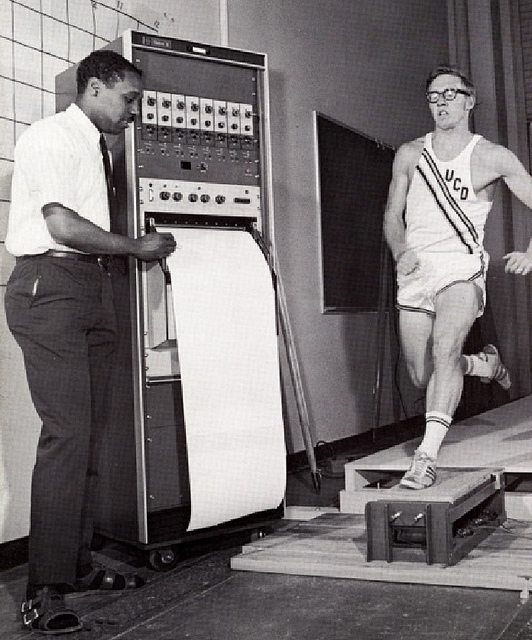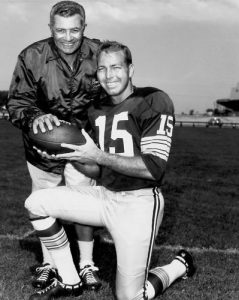
For more than a century, scientists have studied the psychology behind sports and performance. The study of mental toughness, as an offshoot of that discipline, is a relative newcomer. Here’s how it was developed and who are the luminaries in this short history of mental toughness.
Mental toughness provides a way to measure resilience and confidence as well as coaching methods for improvement. From its roots in the 1900s to today’s easy to access performance tools, the concept of mental toughness has evolved. It is now a useful tool for any performance minded person (athlete, entertainer, business person, soldier, and beyond) that wants to manage stress, anxiety, doubt, self-consciousness, and fear – and create breakthrough results.
Early Years of Mental Toughness
In 1898, psychologist Norman Triplett conducted the first recognized sport psychology experiment. His study showed that cyclists in a race were faster in competition with other racers than in individual time-trials, identifying social influence as a motivator.
But it wasn’t until 1925 that Coleman Griffith studied the effect of mental characteristics on sports performance. He worked with the Chicago Cubs until 1940, and is considered the founder of sport psychology.
Little was done in the field for nearly two decades until sport psychologists started unifying in the late 1960s. It didn’t take long for players and coaches in professional sports to take notice. Much of NFL Coach Vince Lombardi’s success is attributed to working with players to remove doubt and to convince them that winning was the only acceptable outcome.
He is famously quoted as saying: “Winning isn’t everything; it’s the only thing.”

Lombardi too is sometimes referred to as the father of mental toughness.
Olympic interest in mental toughness
In the 1980s the U.S. Olympic Committee (USOC) became interested in the potential of sport psychology. In 1983 they created a registry of sport psychologists with advanced degrees to provide referrals to athletes who wanted to improve the mental aspect of their game.
Important Advances in Mental Toughness
If mental toughness only had implications for athletes, it might never have evolved to the extent that is has. However, Dr. Jim Loehr recognized the same principles could be applied to business.
His book, “Mentally Tough: The Principles of Winning at Sports Applied to Winning in Business” was published in 1986. He wrote 15 more books, focusing on the importance of applying energy and focus to be fully engaged in the project at hand.
In recent years the goal has been to establish quantifiable measurements of mental toughness to make it possible to reliably assess resiliency and hardiness. Mental toughness evaluations can also be used to select who can be place in high stress positions and still success.
How Mental Toughness in Sports Psychology Relates to Business
Business leaders need to have their head in the game every bit as much as an athlete. The six main features of mental toughness that easily translate into the challenges that leaders face include:
Sportsmanship
Adversity happens in boardrooms too. Personal attacks must be handled with the same composure as athletes are expected to exhibit on the field.
Resiliency
Knowing how to remain optimistic and rebound quickly in the face of adversity is important in any situation.
Courage and ethics
There will always be the temptation to cut corners or make short-sighted decisions, but acting with with confidence and courage makes it easier to make difficult decisions that are right and that are inside the rules set out by the competitive environment.
Determination
Leaders can face seemingly insurmountable odds just like a team on the field. Having the confidence and strength to persevere is what results in success.
Flexibility
Curve balls happen in more than baseball. Having the ability to remain flexible and find another way to move forward is important. Leaders need to constantly adapt to changes rather than being defensive about an old method that isn’t working.
Responsiveness
This is similar to flexibility, except it addresses how quickly the performer can adapt, and how successfully decisions are made under pressure.
Future of Mental Toughness Coaching
Highly successful companies recognize that providing employees the tools for success profits the business. Mental toughness coaching is especially useful in industries where competition is heavy and escalating complexity puts executives under extreme pressure.
Many occupations are inherently high stress – medical workers, emergency responders, and military personnel, to name a few. But any occupation can be stressful for someone with inadequate mental toughness. Mental toughness coaching as a stress management tool is proving to be effective in many industries and professions.
Parents should consider mental toughness coaching for their children – whether athletic or now. Building resiliency makes it easier to meet life’s challenges and handle the pressures they will inevitably face.
Mental toughness as a discipline has proven it has a place in the coaches’ training arsenal from youth athletics to professional teams. It is increasingly recognized that mental toughness training can be successfully adapted to many other demanding pursuits. This has exciting implications for all professionals who have to compete in ever more competitive environments.
Have you taken our mental toughness test? It takes 2 minutes. Click here



